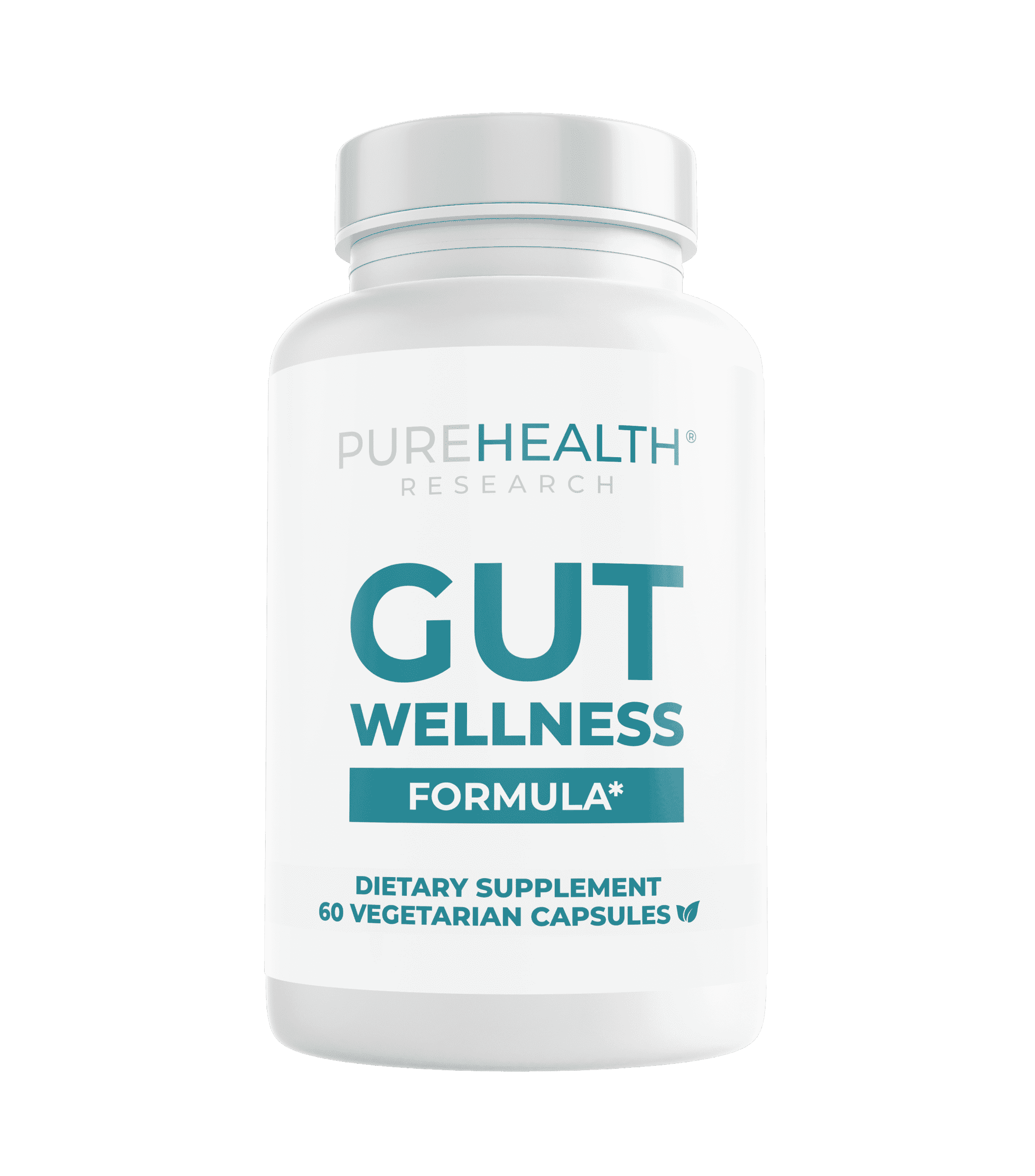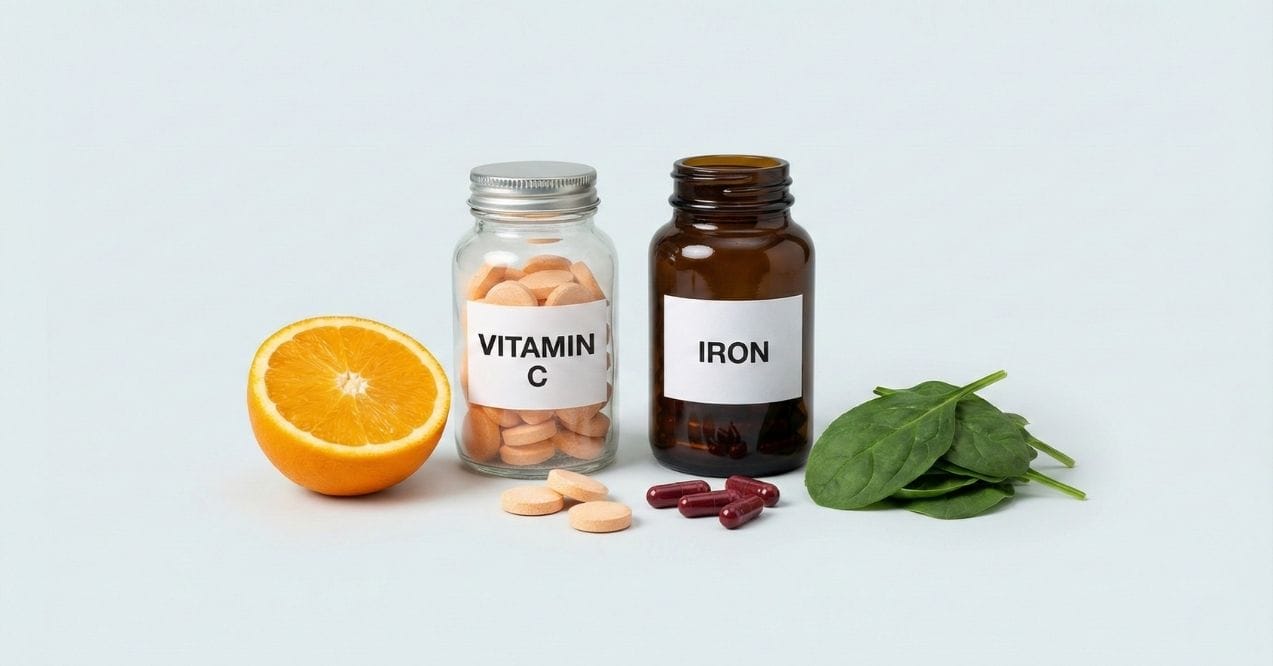Fermented Vitamins: Hype or Helpful?
Traditional vs fermented vitamins: Which is right for your body? Our easy guide helps you make an informed decision.


Fermented vitamins have gained considerable attention in the wellness community recently. This ancient process, traditionally used for food preservation, now extends to nutritional supplements. Fermentation has been part of human history for centuries, transforming foods like cabbage into sauerkraut and milk into yogurt.
Today, this time-honored technique is being applied to vitamin supplements, promising superior nutrition. But do these fermented vitamins truly offer advantages over conventional options, or are they simply the latest trend in an ever-changing supplement landscape? Let’s examine what sets them apart and whether they merit consideration for your wellness routine.
What Are Fermented Vitamins?
Fermented vitamins result from a natural process where microorganisms break down nutrients, transforming them into more accessible forms. Unlike synthetic vitamins created in laboratories or whole-food supplements derived directly from plant sources, fermented vitamins undergo a biological transformation.
Beneficial microorganisms like yeast (Saccharomyces cerevisiae) and various probiotic bacteria act upon the nutrients in a nourishing fermented media, which serves as the growth environment.
During this process, the microorganisms partially digest the nutrients, mimicking aspects of human digestion. This pre-digestion is what potentially makes fermented vitamins more compatible with our digestive systems. The fermentation also creates beneficial byproducts that may work synergistically with the vitamins themselves.
This approach stands apart from conventional supplement manufacturing, which often focuses solely on isolating specific nutrients. For more information about how beneficial bacteria support health, read our article on soil-based probiotics.
Benefits of Fermented Vitamins
Fermented vitamins offer several potential advantages that make them worth considering as part of your nutritional strategy. The fermentation process may alter how your body interacts with these nutrients, offering distinct benefits.
Fermented vitamin D3 benefits, for instance, include potentially improved absorption compared to conventional forms. While traditional supplements have their place, the fermented alternatives present unique attributes that appeal to many, particularly those with sensitive digestive systems or absorption challenges.
1. Improved Absorption & Bioavailability
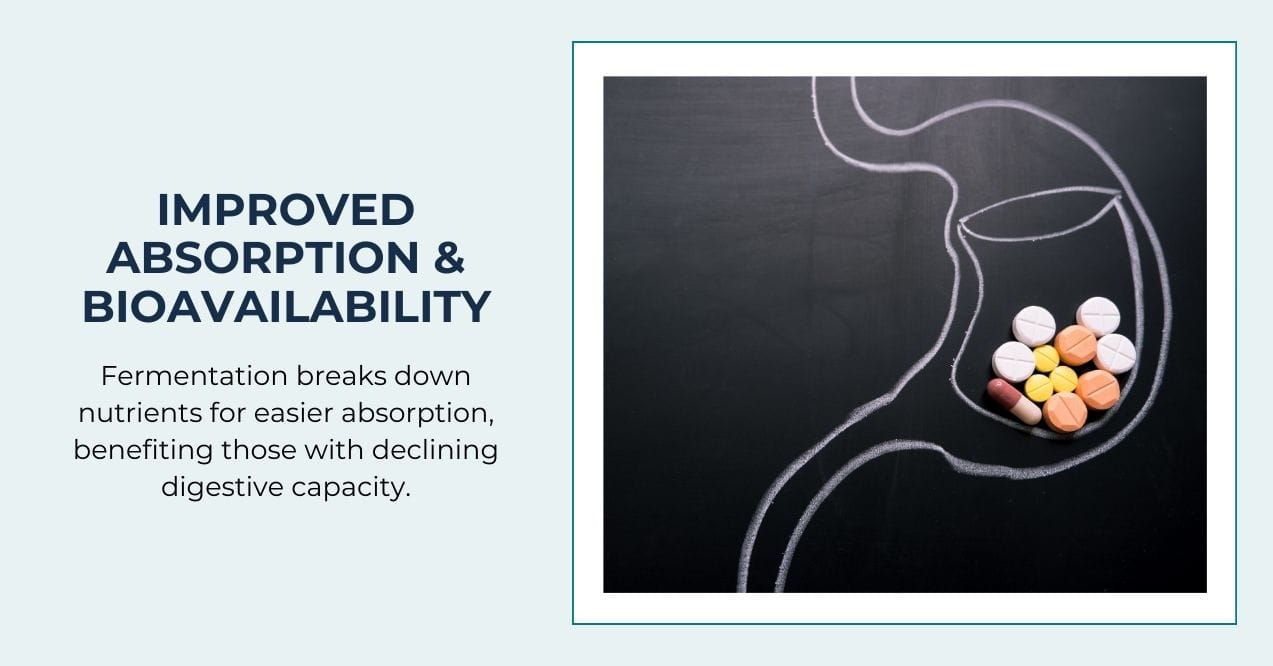
Fermentation naturally breaks down nutrients into smaller, more usable forms. This pre-digestion process means your body may not need to work as hard to access the nutrition. The nutrients exist in a state more closely resembling what your body would create through its own digestive processes. This similarity may allow for more efficient uptake by your digestive tract, especially important for adults with naturally declining digestive capacity.
2. Gentler on Digestion

Many people experience discomfort with traditional supplements, including nausea or stomach upset. Fermented vitamins tend to be milder on the digestive system since the nutrients have been partially broken down already. This gentler quality makes them particularly suitable for those with sensitive stomachs or individuals who take supplements on an empty stomach, reducing the likelihood of digestive distress.
3. Nutrient Synergy
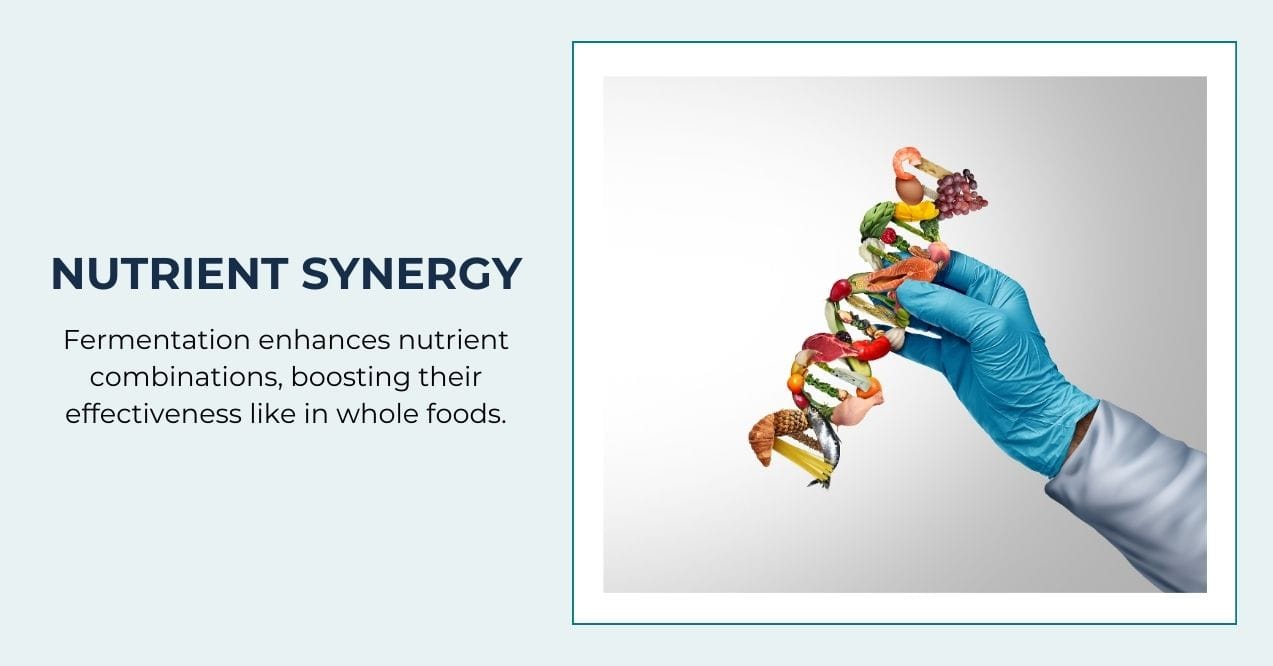
Fermentation creates a matrix of compounds that may work together more effectively than isolated nutrients. This natural synergy mimics how nutrients exist in whole foods, where various components support each other’s function. The combination of primary nutrients with their cofactors and metabolites creates a more complete nutritional profile that supports optimal utilization within the body’s systems.
4. Additional Beneficial Compounds
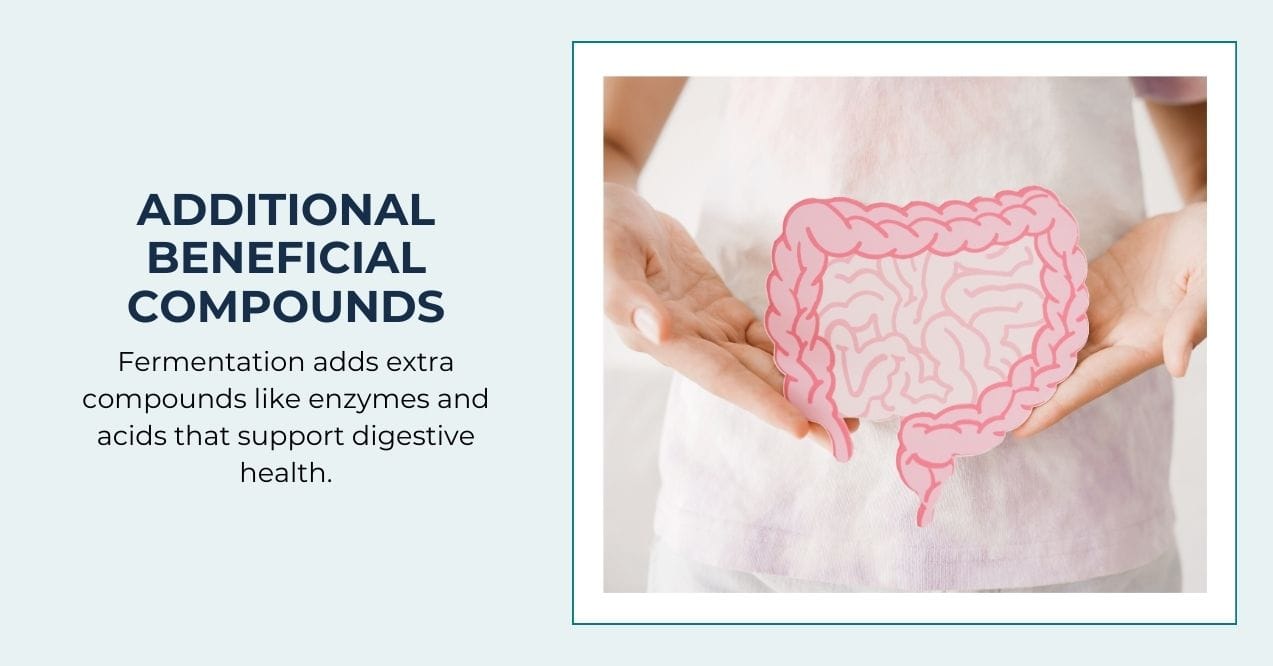
The fermentation process generates beneficial metabolites that aren’t present in conventional supplements. These compounds include organic acids, enzymes, and various bioactive substances that may support digestive health. These additional components create a more complex nutritional profile than what’s found in isolated vitamin supplements, potentially offering broader support for your wellbeing beyond the primary nutrients.
Fermented vs. Non-Fermented Vitamins Comparison
Are fermented vitamins better than conventional options? The answer depends on your specific needs. Fermented multivitamin formulas differ from synthetic and whole-food supplements in production and how they interact with your body. The fermentation creates a unique nutritional matrix combining targeted nutrition with enhanced bioavailability. For insights on fermentation organisms, refer to our guide on yeast vs spore-based probiotics and another ultimate guide on soil-based probiotics.
| Factors | Fermented Nutrients | Synthetic Isolates | Whole-Food Supplements |
| Nutrient Source | Made from food-based vitamins fermented with probiotics/yeast | Lab-created, isolated from food or synthetic compounds | Extracted from whole foods with minimal processing |
| Absorption | Easier for the body to absorb due to fermentation | May be less bioavailable since the body doesn’t always recognize the isolated form | Naturally paired with cofactors that support absorption |
| Digestive Impact | Gentle on digestion, pre-digested by fermentation | Can be harsh on the stomach, especially in high doses | Easy to digest since nutrients come from real food |
| Additional Nutrients | Includes enzymes, probiotics, and beneficial compounds | Contains only the isolated vitamin | Naturally includes phytonutrients, fiber, and cofactors |
| Effectiveness | Better absorption & gut health | Precise dosing for deficiencies | Closest to real food nutrition |
How to Choose a Quality Fermented Vitamin Supplement
Selecting the right fermented supplements requires attention to several key factors. First, look for transparency about the fermentation process—quality manufacturers will openly share their methods. Check for clear labeling that specifies which nutrients have been fermented, as some products may contain a mix of fermented and non-fermented ingredients. Avoid products with artificial additives, fillers, or preservatives that might counteract the benefits of fermentation.
The source matters too—opt for brands using organic ingredients when possible. Consider supplements that list the specific strains of microorganisms used in fermentation, as different strains offer various benefits. For optimal digestive support, you might consider combining fermented vitamins with a comprehensive approach to gut health, such as the Gut Wellness Formula, which complements the gentle nature of fermented nutrients with additional digestive support.

So, Are Fermented Vitamins Worth It?
Fermented vitamins offer compelling potential benefits, particularly for adults experiencing digestive sensitivities or absorption challenges. The fermentation process creates supplements that are often gentler on the stomach while potentially improving nutrient bioavailability. For many adults, especially those over 60 who may have naturally declining digestive capacity, these qualities make fermented vitamins a worthwhile consideration.
However, they typically come with a higher price tag than conventional options. The fermentation process adds complexity and time to manufacturing, which increases costs. While the investment may be justified for those who experience discomfort with standard supplements or who value the additional beneficial compounds, not everyone will find it necessary.
Your overall health status, dietary patterns, and specific nutritional needs should guide your decision. For those focusing on digestive wellness, our article on how to restore gut health after stomach flu provides additional digestive support strategies.
Fermented vitamins may offer better absorption and gentler digestion than traditional supplements. Their pre-digested form helps older adults with decreased digestive capacity. However, “better” depends on individual needs—some may benefit more from targeted conventional supplements.
People with yeast allergies should avoid fermented vitamins since many use Saccharomyces cerevisiae. Those on immunosuppressive medications should consult healthcare providers first. Check ingredients if you have food intolerances, as fermentation media may contain common allergens.
Fermented vitamins undergo transformation by microorganisms that pre-digest nutrients; unfermented ones don’t. This process potentially improves digestibility and creates beneficial byproducts. Unfermented vitamins maintain their original structure, which may affect how your body utilizes them.
Common fermented supplements include vitamin D3 for bone support, B-complex vitamins for energy, and minerals like zinc, iron, and magnesium. Complete fermented multivitamin formulas combine multiple nutrients, while specialized blends target specific health areas.
Sign up for our Healthy Living newsletter!
Advertisement. This site offers health, wellness, fitness and nutritional information and is designed for educational purposes only. You should not rely on this information as a substitute for, nor does it replace, professional medical advice, diagnosis, or treatment. If you have any concerns or questions about your health, you should always consult with a physician or other health-care professional. Do not disregard, avoid or delay obtaining medical or health related advice from your health-care professional because of something you may have read on this site. The use of any information provided on this site is solely at your own risk.
